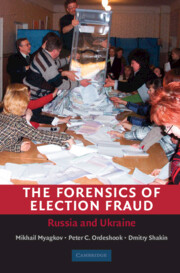5 - Ukraine 2006 and 2007
Published online by Cambridge University Press: 03 February 2010
Summary
The natural cure for an ill administration, in a popular or representative constitution, is a change of men.
Alexander Hamilton, The Federalist, No. 21THE PARLIAMENTARY ELECTION OF 2006
Ukraine's 2006 and 2007 parliamentary elections stand in sharp contrast to its November 2004 presidential runoff vote. Although the November 2004 round witnessed readily substantiated charges of fraud, allegations of voting irregularities were, with few exceptions, virtually nowhere to be found in 2006 or 2007, with international observers proclaiming both elections free and fair without the usual diplomatic double-speak that often frames their assessments. In this chapter, then, we ask whether the statistical evidence for fraud found in the 2004 election is absent in these two contests. Just as our forensic indicators signaled substantial fraud in Putin's reelection, in Russia's subsequent parliamentary vote and in the second round of Ukraine's presidential election, along with its virtual disappearance in Ukraine's December 2004 revote, if the accounts of observers and journalists are accurate, we should expect few suspicious patterns in 2006 or 2007.
As background, we note that Ukraine's political landscape changed considerably between Yushchenko's December 2004 victory and the 2006 parliamentary contest. Yushchenko's Orange Revolution partner, Yulia Timoshenko, was fired as prime minister less than a year after the presidential contest. Thus, each entered the 2006 party list proportional representation contest with separate lists and in direct competition throughout most of Central and Western Ukraine.
- Type
- Chapter
- Information
- The Forensics of Election FraudRussia and Ukraine, pp. 183 - 232Publisher: Cambridge University PressPrint publication year: 2009

